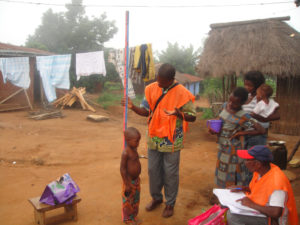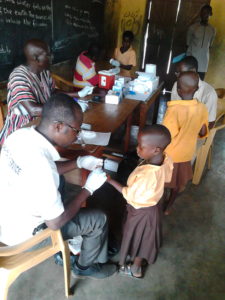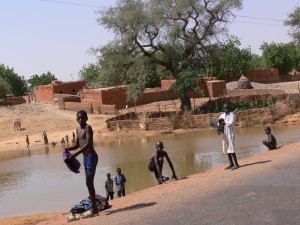A Reflection on the USAID NTD Program’s 10th Anniversary from the Perspective of END In Africa
October 31st, 2016

A community volunteer measures a child in Togo prior to administering preventive medicine for NTDs. Photo: HDI
As the US Agency for International Development (USAID) Neglected Tropical Diseases (NTD) Program celebrates 10 years of hard work toward eliminating and controlling some of the world’s most debilitating diseases, the END in Africa project, managed by FHI 360, marks seven years as USAID’s on-the-ground partner in the fight against NTDs. Since September 29, 2010, when the United States Agency for International Development (USAID) awarded FHI 360 Cooperative Agreement No. AID-OAA-A-10-00050, End Neglected Tropical Diseases in Africa, the END in Africa team has had the honor of being part of the USAID NTD program family, working with ministries of health (MOH), other government entities and NTD partners, to reduce the prevalence of seven NTDs (Lymphatic Filariasis (elephantiasis); Schistosomiasis (bilharzia; snail fever); Trachoma (blinding eye infection); Onchocerciasis (river blindness) and three Soil-Transmitted Helminthes (intestinal worm infections)) by at least half among 70 percent of the world’s affected populations.
The END in Africa team has worked with USAID’s NTD Program in six countries (Burkina Faso, Ghana, Niger, Togo, Sierra Leone and since October 2015, Côte d’Ivoire) and we have never walked alone on this journey or felt isolated. The working

A health worker collects a blood sample from a brave young girl in Ghana to test for lymphatic filariasis. Photo: FHI 360
relationship with USAID’s NTD team, other USAID partners, sub grantees and the MOH, has been fantastic. Throughout the past seven years, the END in Africa team has supported the USAID NTD Program family by taking an “all-hands-on-deck” approach to issue and manage grants between the different levels of program implementation, provide technical assistance and capacity building support, help plan and support implementation of program interventions, manage the supply chain within the project and sometimes even procure NTD drugs, help countries manage financial support, support countries in raising funds from local private enterprises, spread the good news on project successes, and share our experiences on this journey through regular publications on the End in Africa website: http://www.endinafrica.org, which serves as the project’s main communication and knowledge sharing tool.
The successes achieved while working together have justified the extra hours of work, the difficulties encountered along the way, the conflicts we have had to resolve on occasion, and the challenges we have had to work extra hard to overcome. All the countries endemic for trachoma are either in the ‘endgame‘ already or almost at the ‘endgame’, and remarkable successes have been achieved for LF also. Over 80% of districts endemic for trachoma have stopped treatment and over 50% of districts endemic for LF have stopped treatment. Reports available so far indicate that the project has supported NTD efforts in 459 districts, and involved and facilitated training and capacity building for thousands of MOH personnel and over 200,000 community volunteers. In its first 6 years of operations (2011-2016), the project facilitated the treatment of over 200 million people and provision of over 400 million treatments.

Rivers contaminated with infected snails can transmit schistosomiasis to children and adults
Photo © HKI
Such success would not have been possible without teamwork and the support of sub grantees Helen Keller International (HKI) in Burkina Faso, Niger and Sierra Leone; and Health & Development International (HDI) in Togo; as well as two talented FHI 360 teams, who have implemented the project directly in Ghana and Côte d’Ivoire. Thanks in large part to their strong commitment and concerted efforts and the ongoing support from the USAID NTD program, the project can report these good results today, as all the expected outcomes are being achieved. We plan to continue to help improve the lives of the citizens of these countries until every country is bathed in the very bright light that is already visible at the end of the tunnel.

